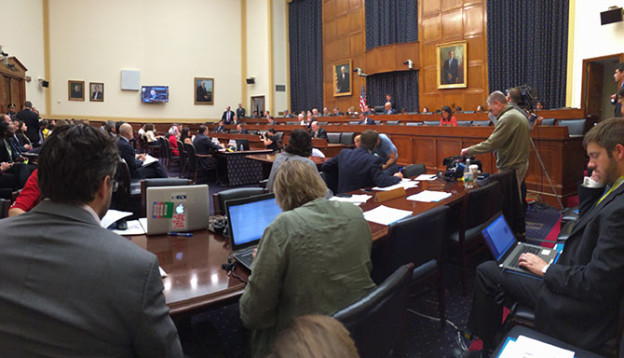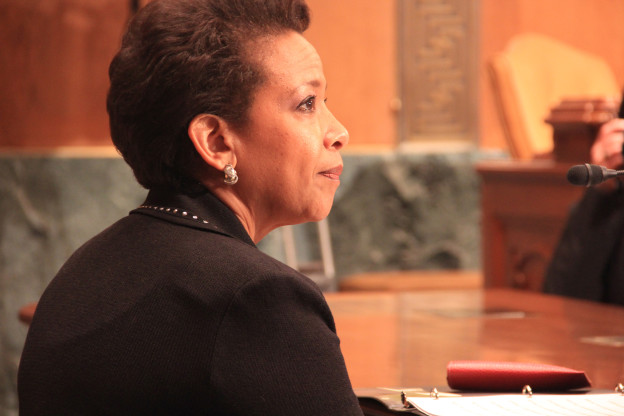
George W. Bush, Laura Bush advocate for vets and their families
By Jennifer-Leigh Oprihory

WASHINGTON — During last week’s Capitol Hill press gaggle, House Armed Services Committee Chairman Rep. William “Mac” Thornberry, R-Texas, turned a chance to offer constructive criticism to national security reporters into a moment of praise for their work and empathy for the challenges they face.
“I think, in general, you know, journalists do a very good job – and certainly better than at any time in our history – of reporting events that happen around the world,” he said.
When asked how well the media has been covering the national security beat, Thornberry opted to stand aside.
“I think I am not very well-positioned to critique somebody else’s job,” he told the small group of reporters and staffers who sat around a table and along the walls of a Rayburn House Office Building conference room.
“I have a big enough problem just trying to critique myself at my own job.”
He empathized with the seeming sensory overload that he said is encountered by reporters and politicians, alike.
“I think all of us — including me — have a harder time seeing the bigger trends because there’s a constant barrage of new, individual events and developments,” he said. “One of the challenges of the intelligence community, one of the challenges for us, you know, as policymakers, is to just kind of … take into account these individual events that we get barraged with every day and see the broader trends that you can do something about. And that’s hard.”
He said that the onus of sifting through this commotion to uncover important patterns doesn’t just fall on journalists.
“It’s up to all of us,” he said. “It’s part of the information age.”

WASHINGTON — Rayburn House Office Building Room 2172 was filled with reporters, congressmen and human rights activists on Tuesday morning.
But the presences that dominated the room were those of four American citizens stranded thousands of miles away, held prisoner by the Islamic Republic of Iran.
The House Foreign Affairs Committee convened the morning hearing to gather stories from family members of the four Americans currently imprisoned in Iran: former Washington Post Tehran Bureau Chief Jason Rezaian, former U.S. Marine Sergeant (E-5) Amir Hekmati (who served from 2001-2005), Christian Rev. Saeed Abedini and U.S. government contractor Robert Levinson.
The hearing was held ahead before the committee voted to approve H. Res. 233, a bill that condemns Iran’s refusal to release these detainees and demands transparency about “any other United States Citizens that have disappeared within its borders.”
The prisoners’ relatives testified that the window for their release may close once U.S.-Iran nuclear talks end and Iran no longer needs them as leverage.
“I think if the [nuclear] talks fail and there is no deal, that we could lose the engagement and the constructive talks that we’re having right now,” Daniel Levinson, son of Robert Levinson, said. “Those could cease, and then we’re back to square one.”
Even if the U.S. succeeds in striking a deal, he said, any “sense of urgency” to bring back his father and the other witnesses’ loved ones could disintegrate as soon as it is inked.
The timeline hasn’t caused the detainees’ families to lose hope.
Levinson said his family is encouraged by the Rouhani administration’s attempts at engaging with the United States — albeit not concerning his father’s status.
“We believe that, if the Iranian government had the will and motivation to locate my father and send him home, they most certainly could,” his prepared testimony reads, calling Iran’s engagement with the U.S. “ by far our best opportunity to bring my father home safely.”
Despite the fact that his case was historic in its severity — including a now-annulled death sentence — Amir Hekmati’s sister, Sarah, draws inspiration from the unprecedented communication occurring between the U.S. and Iran today.
“It is … the first time in decades that the United States and Iran are having conversations with each other instead of conversations with third parties,” she wrote in her prepared testimony. “Now is the time that this issue could and should be resolved.”
Naghmeh Abedini, whose husband was imprisoned for participating in a Bible study and whose release is allegedly contingent on his conversion to Islam, said she and her family are relying on their Christian faith to get them through.
“I know that God is with us in this journey, but I also know that God can use men and women to bring about freedom and justice,” her prepared testimony reads.
Jason Rezaian’s brother, Ali, said he appreciated the help from Washington Post staff and the Obama administration on his brother’s behalf, but still expressed concerns about his brother’s health and the conditions of his imprisonment. He noted that their mother was absent from the hearing because she is in Tehran trying to monitor Jason’s espionage trial, which began last week.
“Let me be very clear: The charges against Jason are false,” he said. “With the help of this committee, and others from around the world, I believe Uncle Jason and [Rezaian’s 7-year-old son] Paxton can still see an A’s game in Oakland together this summer.”

WASHINGTON – Attorney General Loretta Lynch said Thursday that improving police-community relations is important in the wake of incidents in Baltimore, Ferguson, Missouri and elsewhere, but the Justice Department’s primary goal is to protect Americans from terrorists and other national security threats.
“Our most important objective must continue to be protecting the American people from terrorism and other threats to our national security,” she said.
The hearing marked Lynch’s first testimony on the Hill since her April 23 confirmation as Eric Holder’s replacement at the Department of Justice. A few days earlier, she had visited Baltimore in the wake of uprisings stemming from the April 19 death of Freddie Gray in Baltimore Police Department custody. Six officers have been charged. The Justice Department has launched an investigation of the Baltimore Police Department at the request of the city’s mayor.
Lynch identified improving police-community relations as one of her chief priorities in her new post, alongside “safeguarding our national security” and “defending the most vulnerable among us.”
Maryland Democratic Senator Barbara Mikulski, a Baltimore native, urged Lynch to help bridge the gap between police departments and wary communities during a Thursday hearing by the Senate Appropriations Committee’s Subcommittee on Commerce, Justice, Science, and Related Agencies.
“In many cities throughout the country, and including my own town of Baltimore, and in communities primarily that have significant populations of color, there has been now a tired, worn and even broken trust between the community and the police department,” Mikulski told Lynch during the hearing. “We’ve got to restore that trust.”
Mikulski suggested ethical training courses on the use of force and bias based on race and ethnicity should be mandatory for Department of Justice grant funding of local police departments.
Lynch started off her testimony by aligning herself with law enforcement officers, remembering two who lost their lives on the job in the past week (in New York and Idaho, respectively) and calling for increased sympathy for cops.
“At this particular time in history, it’s important that we take a moment to consider the contributions and the needs of our law enforcement officers across the country,” she said.
But she also said police must be held accountable for their actions.
“When there are allegations of wrongdoing made against individual officers and police departments, the Department of Justice has a responsibility to examine the evidence and, if necessary, to help them implement change,” Lynch said.
Her testimony touched on her visit to Baltimore last week, citing meetings with local authorities and community leaders to brainstorm opportunities for collaboration, and expressing cautious optimism about Baltimore’s police reform efforts thus far.
“Although the city has made significant strides in their collaborative reform efforts with the community oriented policing services office, I have not ruled out the possibility that more may need to be done,” she said.
Mikulski, who serves as vice chairwoman for both the Senate Appropriations Committee and its Subcommittee on Commerce, Justice, Science, and Related Agencies, also asked Lynch to revisit “the so-called broken window policy” when it comes to policing.
As explained by Mikulski, the theory behind the policy promotes the prevention of major crime through early intervention with youth when they commit lower-scale infractions. But she said that parts of the policy, such as combating issues of truancy and an excess of vacant homes, are being overlooked, resulting in a broken process.
“Now, what seems to happen is the policy has deteriorated where we’ve stopped fixing the broken window and we’ve escalated to frisking,” Mikulski said. “No more fixing, but lots of frisking, and that’s what our folks feel.”
Watch Lynch’s full testimony before the CJS Subcommittee here:
(Video via the CJS Subcommittee website)
CORRECTION: An earlier version of this story erroneously stated that, at press time, six police officers had been indicted — rather than charged — in connection with Freddie Gray’s death.

WASHINGTON – The cyber domain can give the Air Force unprecedented control over the way it carries out its missions, United States Air Force Chief of Staff Gen. Mark A. Welsh III said at an event Wednesday.
Speaking to a group of active-duty military personnel, civilian defense insiders and journalists, Welsh likened the Air Force’s expansion into the cyber realm to its prior addition of space to its command repertoire, saying its cyber involvement is meant to complement – rather than replace – its primary-domain activities.
But despite the shift, Welsh said the cyber playing field gives the Air Force a two-fold precision advantage in mission execution by improving the reach of the missions and the control over the scope of attacks.
“We have access through the cyber domain to targets that we couldn’t get to before,” he said.
Cyber gives the Air Force the option to deactivate sections of networks or communication chains compared with wiping them out completely, he said.
He also noted that cyber attacks are easier and more precise than dropping “a very precise weapon that has 500 pounds of TNT in it.”
“There’s nothing precise about that,” Welsh said.
Welsh acknowledged that government cyber professionals are wary of Defense Department involvement in the cyber sector “because DoD brings blunt-force trauma to everything” by virtue of its size and “heavy footprint.”
The forum was sponsored by Defense One and Northrop Grumman.
Listen to Gen. Welsh in conversation with DefenseOne reporter Marcus Weisgerber on cyber and the Air Force here:
WASHINGTON — Veteran education is a perennially urgent issue for members of the United States military.
In order to raise awareness about barriers to veteran education and initiatives being undertaken to improve it, National Louis University and Student Veterans of America joined forces to host March 26’s “Improving Veteran Education Symposium” at the U.S. Capitol Visitor Center in Washington.
There, the Medill National Security Journalism Initiative spoke with two expert panelists (who also happen to be veterans themselves) to get the inside scoop on how the media can do a better job of covering veteran education.
Advice from Megan Everett, Northwestern University alum, Program Officer of the Veterans Program at the Robert R. McCormick Foundation and United States Navy veteran:
Advice from David Goldich, Senior Consultant at Gallup and United States Marine Corps veteran:

WASHINGTON — Rep. Mac Thornberry, R-Texas, doesn’t want America to fear the future.
Terrorism, cyberattacks, epidemics and tumult in the Mideast and Africa threaten U.S. security, he says, and the Defense Department needs to be ready. To him that means reforms are needed in acquisition of goods and services, personnel and organization. Especially important is buying technology to keep pace with the changing environment.
“Nobody can foresee what’s going to happen over the next 16 months,” he said recently. “What we do know is the velocity of change is accelerating and that the unexpected will spring out on us. The question is how well do we, or how well can we, respond.”
“Today you see countries like Russia and China trying to outflank us using technology, whether it’s deploying carrier-killing missiles or building radar that can detect stealth.”.
Thornberry, who chairs the House Armed Services Committee, said the U.S. edge in technology is decreasing, citing “the general pace of change” and “our broken budget process and acquisition process” as factors contributing to what he calls “an eroding American technological superiority.”
“The only defense is to adapt quicker than they do,” he said. “I don’t want to see America outflanked.”
Thornberry has proposed acquisition reform legislation, co-sponsoring with Rep. Adam Smith, D-Wash., a bill called the Agile Acquisition to Retain Technological Edge Act, H.R. 1597.
According to a House Armed Services Committee press release, the bill’s introduction was timed so that the public’s feedback could be obtained before the legislative ball starts rolling on the 2016 National Defense Authorization Act. This way, Thornberry explained at the Center for Strategic and International Studies on March 23, the bill could function as “a discussion draft for the first tranche of legislative proposals to fix our acquisitions system.” During his CSIS talk, Thornberry noted that the full committee markup of the newest iteration of the NDAA is slated to begin on April 29.
Here is an introductory guide to this legislation.
Full Text of H.R. 1597:
(Source: House Armed Services Committee)
Draft Report on H.R. 1597:
(Source: House Armed Services Committee)
A Quick Outline of What Reforms Thornberry Has Proposed
(Source: Center for Strategic and International Studies talk on March 23, 2015)
Watch Thornberry’s full CSIS address here:
Expert Feedback
CSIS Defense-Industrial Initiatives Group Director Andrew Hunter praised Thornberry for capturing “both sides of the coin,” in the sense that the plan married good intentions with an awareness of the facts that other potentially positive plans of action are out there and a “silver-bullet quick fix to the system” doesn’t exist. He said Thornberry’s “areas of focus and the way he’s thinking about the problem” were very optimistic, despite the fact that the language of the legislation was pending at the time of the interview.
Hunter said he interpreted Thornberry’s chain-of-command simplification goal to mean that every person in the acquisitions process would not have veto power versus experts being nixed from the process.
“At the end of the day, what you want is you want experts who come to you and say ‘no kidding, this is how we see it; this is, this is our vision of ground truth,’” he said, going on to explain that there needs to be an individual separate from the experts to distill various experts’ input and perspectives into a final, authoritative decision.
Hunter said he thinks Thornberry is on the right track, but that “acquisition workforce is critical” and that he wants program managers “to have good judgment” and a basic comprehension of the acquisitions-sector discipline. He also said he’d like to see defense acquisition reforms mirror changes occurring in technology and industry.
“The world of today and the world certainly of tomorrow is not the world of the 50s and 60s, and, so, we definitely want to make sure that we are adapting and adaptable to those changes,” Hunter said.
5 Questions Reporters Could Ask About the Bill: